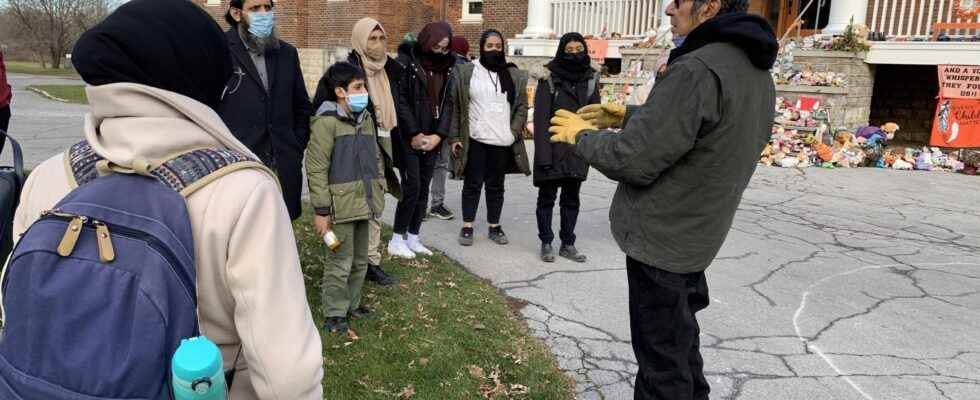Content article
Two dozen Muslim youth from around southern Ontario got a crash course in local Indigenous history Saturday, capping off a multi-week virtual course with some in-person experiences.
Content article
The teens and leaders visited Six Nations of the Grand River, touring St. Peter’s Anglican Church, a longhouse, band council’s administration building and the water treatment plant, then ended with a visit to the Woodland Cultural Center in Brantford, where they met a residential school survivor outside the former Mohawk Institute.
“I’ve learned so much,” said 16-year-old Arooj Awan, of Woodbridge.
“I had never heard of any opportunities where Muslim and Indigenous people had a way to come together so this felt like a once in a lifetime opportunity.”
Awan said she was particularly taken with an exhibit in the museum that shows how indigenous items had been commercialized by non-indigenous people and companies.
“I couldn’t tell the difference in them so it showed me a bit of my own ignorance.”
Another participant, Aaliyah Suleman from Markham, said the day had shown her how much she didn’t know.
“We only learn so much in school. So, it’s been heartbreaking to learn this was happening in my country. I know more about things happening on the other side of the world than in my own backyard. ”
During the virtual portion of the initiative, the young people heard from several Imams about the Islamic perspective of reconciliation and from local Indigenous leaders about the Six Nations culture, faith, history and challenges.
Begun by three Muslim leaders, including Imam Abu Noman Tarek in Brantford, the Muslim-Indigenous Connection program drew in Justice For All Canada, a human rights organization that fights the oppression of Muslim minorities around the world.
Content article
That charity’s executive director, Taha Ghayyur, said Saturday the planners wanted the program to be eye-opening for those involved.
“Canadian Muslim youth have seen the ugly face of hate in Canada,” Ghayyur said. “They have experienced their own dilemmas of being stereotyped but we don’t want to become guilty of doing something to others that we ask others not to do.”
He said he hopes the program will turn the participants into advocates and allies of Canada’s Indigenous people.
At the end of the day, the students signed a pledge to continue creating “allyship” with their Indigenous brothers and sisters, following the Islamic principles of justice, compassion and interconnectedness.
Tarek, who was helping host the students at the Brantford Mosque on Greenwich Street, said it’s a fundamental responsibility of every Muslim to respectfully reach out to their Indigenous neighbors to be part of the truth and reconciliation process.
“Standing for justice, being excellent to neighbors, listening and learning from original sources, are some of the core value of Islam,” said Tarek.
SGamble@postmedia.com
@EXPSGamble
